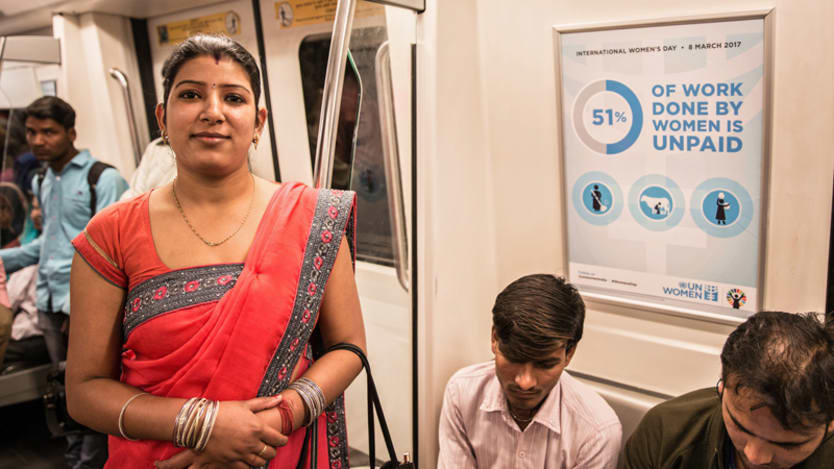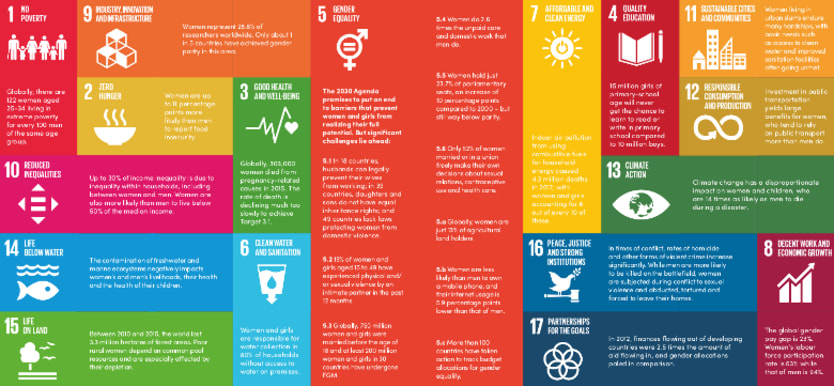
LONDON — The United Nations has warned that progress towards meeting the Sustainable Development Goals for women and girls is “unacceptably slow,” and has called for better data as well as a special focus on unpaid care work and ending violence against women to drive change.
The monitoring report from UN Women, Turning Promises into Action, released Wednesday, assesses progress towards the 2030 Sustainable Development Agenda, specifically looking at efforts to achieve gender equality — a prominent and cross-cutting issue across all 17 goals, the report states, as well as a standalone goal in itself.
“Progress for women and girls remains unacceptably slow,” UN Women Executive Director Phumzile Mlambo-Ngcuka said in the report, adding that this “new data and analysis underlines that, unless progress on gender equality is significantly accelerated, the global community will not be able to keep its promise.”

While there has been some progress in recent years, the report concludes that the focus on women and girls provided by the SDGs is yet to turn into practice in most countries. For example, 15 million primary school-aged girls are out of school globally, compared to about 10 million boys; women hold only 24 percent of parliamentary seats; the gender pay gap stands at 23 percent; and gender-based violence is still a “global pandemic,” the report states.
It shines a light on huge disparities in the opportunities offered to women and girls living in the same countries. In India, for example, a woman aged 20–24 from a poor, rural household is 21.8 times less likely to have attended school, and 5 times more likely to have married before the age of 18, compared with a woman of the same age from a rich, urban household. Such disparities in education and opportunities also persist in developed nations, the report finds.
Furthermore, new and re-emerging challenges, such as conservative attitudes towards women’s sexual and reproductive health and rights, as well as climate change and environmental degradation, which are undermining “the livelihoods of millions,” are putting increasing pressure on women’s opportunities, the report warns.
It points to a number of key challenges holding back progress and concludes that “making every woman and girl count will require a revolution not only in gender data but also in policies, programming and accountability,” and offers recommendations to help member countries translate positive rhetoric about equality into practice.
Better data, statistics, and analysis on gender can be used to hold governments, companies, and other stakeholders accountable for their commitments to gender equality, UN Women advises. Additional financing and policies are also needed, it says.
See more related topics:
► How should we measure 'women's economic empowerment'?
► 3 ways gender data could go 'big'
► Opinion: A call to action on gender equality in global health
► Policymakers 'flying blind' on gender issues, survey finds
► Opinion: Once upon a statistic — why we're calling for gender data impact stories
Katja Iversen, head of Women Deliver, said the report contained “stronger messages, findings, and recommendations than we normally hear from a U.N. agency,” which she said is “very appropriate at a time when conservative winds are blowing” and threatening women’s health and rights.
She also commended the report for promoting an “integrated approach — looking at the whole girl and the whole woman and how the different dimensions of the SDGs are deeply intertwined with women’s well-being.”
“The evidence is clear: If we want to solve the world’s biggest problems, we need to break down the silos and work together across issues, sectors, and geographies — with women at the center,” she added.
Better data
Despite increasing attention to gender statistics in recent decades, effectively tracking and monitoring progress against the global goals is challenging in many countries for a number of reasons, including “uneven coverage” of gender indicators across the targets.
For example, UN Women finds that only 10 out of 54 gender-specific indicators are collected with enough regularity to be classified as Tier 1 by the Inter-Agency and Expert Group, which means they can be monitored in a reliable way at the global level. For another 24 gender indicators, “coverage is patchy and insufficient to allow global monitoring,” the report states, while 17 indicators are still being developed.
The report also points to a lack of internationally-agreed standards around how the data is collected as another fundamental challenge to effective monitoring.
Tanvi Jaluka, program coordinator for gender and development at the Center for Global Development, said the report was right to focus on the need for more and better data to monitor the SDG’s progress on women and girls.
“Holes in gender data exist because methodologies are not clear or because data standards are not actively being practiced by countries,” she said.
New areas of focus
UN Women on the hunt for a blockchain solution
UN Women hosted live simulations of blockchain apps and programs focused on identity and cash transfers in New York on Tuesday. Caroline Rusten, the organization's chief of humanitarian work, talks to Devex about how they hope the technology could help them better target the needs of women and girls.
Ensuring gender-equitable access to financial services is another major priority highlighted in the UN Women report, and one which Jaluka said currently receives too little attention.
“Unfortunately, a lot of attention is paid to the creation of jobs in the private sector and not to reducing the gender gap in financial services,” she said, adding that “countries should work with financial institutions to invest in and test innovative financial products, as well as deliver products that are specifically targeted toward women.”
“Taking these steps will promote productive labor activities, small and medium enterprise business growth, and savings and investment,” the CGD expert added.
The report also makes specific recommendations for change around unpaid care work which experts say is one of the key reasons why women, as the default providers of care, are less likely to have quality jobs, attend school, participate in political life, and become financially independent.
In South Africa, for example, providing free and universal child care for children aged 0 to 5 would “at least in part” pay for itself, the report suggests, by creating between 2.3 million new jobs and bringing 10 percent more women into the workforce. The associated tax and social security revenue from these new jobs would cover more than a third of the costs of investing in free early childhood education and care, it says.
The report also takes an indepth look at the issue of violence against women and girls, noting that despite the prevalence of violence against women inflicted by an intimate partner, there are still no laws to protect victims from such abuse in 49 countries. It offers a range of recommendations, including pushing countries to adopt and implement comprehensive legislation, and overhauling services for victims in order to reach the most marginalized.








